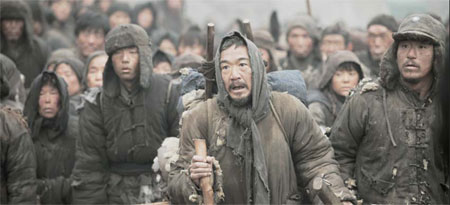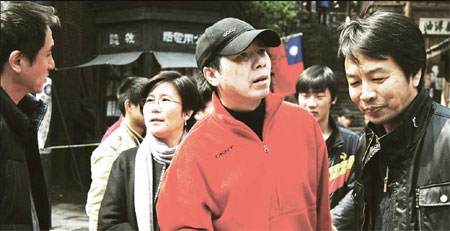Forgotten history
Updated: 2013-01-04 09:48
By Mariella Radaelli (China Daily)
|
|||||||||||
|
Above: Feng (in red) says he felt the need to narrate a lost chapter of history and that is why he made the film Back to 1942. Below: Feng depicts a tragic famine that ravaged Henan province in 1942, resulting in the deaths of 3 million people. Photos Provided to China Daily |

Moved by the story of a famine that killed millions during World War II, director Feng Xiaogang decided to tell the tale in his latest movie
The Chinese director Feng Xiaogang's latest movie Back to 1942 is, as the title suggests, a story from China's recent history. Epic in scale and designed to tug at the heartstrings, it was prompted by a desire to tell people about an almost forgotten event in the hope that it may never happen again.
Feng, one of the most successful commercial film directors in China, depicts a famine that ravaged Henan province in 1942, during World War II, resulting in the deaths of 3 million people.
The film, with impressive special effects, premiered at the Rome Film Festival in November, and won the AIC Award for Best Cinematography and the Golden Butterfly Award.
The film was adapted from the non-fiction novel Remembering 1942 by Liu Zhengyun, who also worked on the screenplay.
I met Feng at the roof garden restaurant of the Bernini Bristol Hotel, on Piazza Barberina in Rome, along with the cast members Zhang Guoli and Xu Fan, who is Feng's wife.
Zhang plays landlord Fan, the protagonist, a sentimental and melodramatic character, while Xu is his tenant Hua Zhi.
The movie also includes the Chinese actors Chen Daoming, Zhang Mo and Zhang Hanyu, and the American actors Adrien Brody (The Pianist) and Tim Robbins (Mystic River), who add international gravitas to the production.
Brody plays Theodore White, an impassioned American journalist from Time magazine, and Robbins plays a pragmatic Catholic priest called Thomas Megan, both of whom Fan encounters on a perilous journey south in search of food.
According to Feng, he chose the two US A-list actors "because they were both so fascinated with the story".
He wanted actors who were both talented and big names, "and Adrien Brody and Tim Robbins combine these two aspects", he says. "In addition, Adrien is so familiar with the 1940s. He had already worked on movies set in the 40s."
At 210 million yuan (almost 35 million dollars) Back to 1942 is the most expensive movie ever shot in China.
"It was totally financed by ourselves, by our production company," Feng says.
When asked why he felt the need to narrate this particular part of China's past, the director says: "Because it's a lost chapter of our history. We have a small number of history books on the 20th century, and they don't mention this tragedy."
He was moved by Liu's book when he first read it in 1993, soon after it was published, and was aware that few Chinese knew anything about the famine.
"That's why I felt the duty to turn it into a movie. The writer was thrilled, though it was very difficult to transpose the language of the novel into the script, since the book is a kind of investigative story with no plot and no characters at all.
"This material is extremely valuable today. We must fight forgetfulness, which is not a blessing. I wanted to be truthful to history. Three million people died -- about half as many as the number of European Jews murdered by the Nazi regime during the Holocaust."
The famine was caused by severe drought and exacerbated by locusts, windstorms, earthquakes, disease and corruption in the Kuomintang government.
In the movie, hundreds of famished farmers descend one night on Fan's house holding torches. He holds the final stocks of grain in Laozhuang Village. Afraid of the mob, he prepares a banquet for them, but old feuds are rekindled and his property is burnt to the ground.
Meanwhile, Japanese troops and nationalist forces are preparing to fight in northern Henan and the province's grain supply is to be sent to the military.
Realizing the danger of the situation, the provincial chairman, Li Peiji, pays a visit to General Chiang Kai-shek in Chongqing, but does not have the courage to speak up. Homeless and hungry, Fan is forced to join the millions of refugees on a trek toward Shaanxi province in search of food.
Back to 1942 deals with a variety of themes and offers insight into the meanderings of the human mind.
"At first glance, the film is only about a catastrophe," Feng says. "In reality, this film represents something more."
He compares the story to a mirror that reflects a minutely faithful representation of the human soul. "Every time you look at the film you don't see only the good and virtuous sides; you perceive your weaknesses too, the reality of the human being, dramatically struggling between good and evil."
Does this mean that Back to 1942 represents a journey into the Chinese soul? "Exactly. Without a mirror, we often think that we are so beautiful, which is very much appreciated, but once we realize that's not the only reality, we must find the courage to see ourselves in the mirror so as to see the whole reality, which could be unpleasant, but it's much better than ignoring the truth. Without this mirror, you end up blind. If you bring on oblivion, you don't know what's really going on. That's why this mirror is a kind of warning sign to me."
The movie is made up of several related stories communicated through five perspectives: Fan, the Chinese government, the Catholic Church, Japanese soldiers and the refugees.
The son of a college professor, Feng Xiaogang was born in Beijing in 1958. He began his cinema career as an art designer at the Beijing Television Art Center in 1985. In the late 1990s he established himself in the Hesui Pian genre (a style of film shown around the Chinese new year).
Of his future plans Feng says: "My next movie will be a very fun comedy. It was physically and psychologically exhausting to make Back to 1942. I am so fatigued that now I need to make some more lighthearted movies for a while. I yearn to take a break from tragedy."
Asked why he chose Rome to launch Back to 1942, he says: "Italian culture has such a rich history. Lots of good people have suffered here. The Italian audience is surely able to connect and empathize with my story and characters. Yes, it's a matter of empathy."
Feng previously tried to make the movie in 2000, 2002 and again in 2004, but on each occasion failed.
"Everybody used to tell me, 'Forget about it,' but Liu, on the contrary, encouraged me. So we worked on a first draft in a hotel room, where we finally made the decision to move on. After a while, we found the right direction in which to describe these poor people."
Feng's reputation in China helped him bypass any potential government intervention in making the movie.
"I had total freedom this time," he says. "After 20 years of commercial movies, I have gained trust in China."
Feng equates Liu Zhengyun' s literary talent to that of the Nobel Prize winner Mo Yan.
"Liu, our screenwriter, is a master at dissecting a subject. He gets into the depth of it. In addition, he has a very firm understanding of our identity, what it means to be Chinese."
He hopes that the film will influence young people and raise awareness of what happened. "It will probably affect school education too."
Feng's movies, which include Aftershock, Assembly and If You Are the One, capture the interest of common people, "because they arrive directly to their hearts and minds," his wife Xu Fan says.
By establishing a cultural link with the Chinese people, Feng has become truly admired by the public, she says, and his new year's movies were very important to the Chinese because they made them happy.
"He can give them the answers they want to hear," she says.
His comedies reflect Chinese social concerns, especially regarding family relationships.
"In today's society, most Chinese people are too busy to enjoy life, which can mean that certain relationships are given a low priority. They forget what happiness is," she adds.
Feng uses verbal and situational irony in his movies. Even in an epic like Back to 1942 irony works, Feng says, "because the Chinese have a natural sense of humor when discussing human issues, and our language is fantastically easy to pun".
On the current state of the Chinese film industry, he says: "China's movie market is still facing problems, because of tough competition with Hollywood. It's quite hard for Chinese directors, but I am confident that after some hardship, conditions will improve. The Chinese possess a history of over 5,000 years, which means that we have so many very Chinese stories to tell. We will be able to reveal them all."
For China Daily
(China Daily 01/04/2013 page29)
Today's Top News
Police continue manhunt for 2nd bombing suspect
H7N9 flu transmission studied
8% growth predicted for Q2
Nuke reactor gets foreign contract
First couple on Time's list of most influential
'Green' awareness levels drop in Beijing
Palace Museum spruces up
Trading channels 'need to broaden'
Hot Topics
Lunar probe , China growth forecasts, Emission rules get tougher, China seen through 'colored lens', International board,
Editor's Picks

|

|

|

|

|

|






